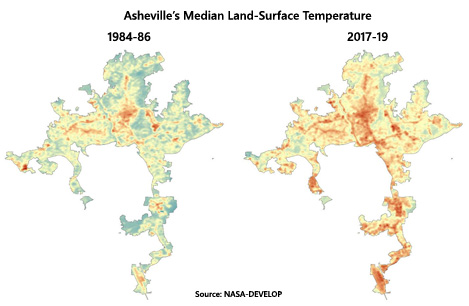Although it sits in the midst of the cool Appalachian temperate rain forest, Asheville, North Carolina, has been losing nearly 100 acres of tree canopy a year to bad development practices since at least 2008, and the city’s land-surface temperature has gotten hotter by as much as 31° F. in some neighborhoods over the last three decades thanks to tree loss and climate change.
That’s why we’re working closely with grassroots activists, public officials, scientists, and others to reverse this trend and enhance Asheville’s climate resilience. Here are some important resources you can read, watch, listen to, and join if you, too, care about saving our urban forest — our only effective defense against stormwater flooding and erosion, urban heat-island effect, and other increasingly dangerous consequences of climate change.
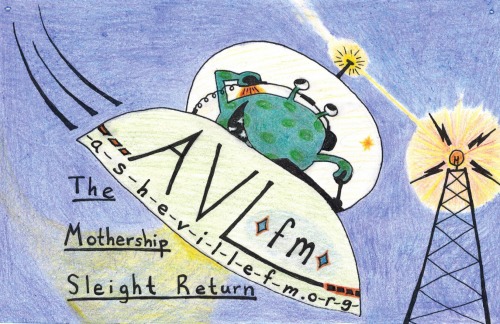 “Save Asheville’s Tree Canopy”: P Funk, host of “The Mothership Slight Return” on Ashevillefm103.3, interviews Queen Lady Passion & Steve Rasmussen (*Diuvei) about Asheville’s worsening tree-loss crisis, the crucial role trees play in mitigating climate change, and the rapidly growing movement to save Asheville’s urban tree canopy from environmentally destructive development practices, on Dec. 5, 2019.
“Save Asheville’s Tree Canopy”: P Funk, host of “The Mothership Slight Return” on Ashevillefm103.3, interviews Queen Lady Passion & Steve Rasmussen (*Diuvei) about Asheville’s worsening tree-loss crisis, the crucial role trees play in mitigating climate change, and the rapidly growing movement to save Asheville’s urban tree canopy from environmentally destructive development practices, on Dec. 5, 2019.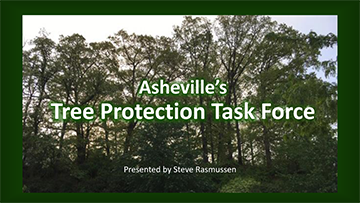 “Asheville’s Tree Protection Task Force”: View the presentation Steve Rasmussen gave about this local tree-activist group to the Asheville Breakfast Rotary Club on June 3, 2020.
“Asheville’s Tree Protection Task Force”: View the presentation Steve Rasmussen gave about this local tree-activist group to the Asheville Breakfast Rotary Club on June 3, 2020.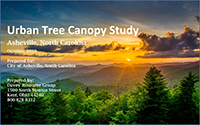 The City-commissioned Urban Tree Canopy Study released in Oct. 2019 found an alarming loss of nearly 900 acres, or 6.4%, of Asheville’s tree canopy from 2008-2018. Those lost trees would have absorbed from our atmosphere nearly 6,000 tons of carbon (= 2 million gallons of gasoline), and kept out of our streets and streams 18 million gallons of stormwater (= 27 Olympic swimming pools) — an economic cost of $8.5 million dollars.
The City-commissioned Urban Tree Canopy Study released in Oct. 2019 found an alarming loss of nearly 900 acres, or 6.4%, of Asheville’s tree canopy from 2008-2018. Those lost trees would have absorbed from our atmosphere nearly 6,000 tons of carbon (= 2 million gallons of gasoline), and kept out of our streets and streams 18 million gallons of stormwater (= 27 Olympic swimming pools) — an economic cost of $8.5 million dollars. NASA’s DEVELOP Program utilized decades of satellite measurements of the Asheville area’s land-surface temperatures to determine that tree loss in the city between 1984 and 2019 correlates with a steep rise in median May-Sept. daytime temperatures — as much as 31° increase in some neighborhoods. Download “Tree Cover and Urban Heat Islands in Asheville”, the NASA-DEVELOP team’s presentation to the “Climate Change and Asheville’s Urban Forest Symposium” held on Nov. 14, 2019, in either .PDF (slides only) or Powerpoint (includes commentary) format.
NASA’s DEVELOP Program utilized decades of satellite measurements of the Asheville area’s land-surface temperatures to determine that tree loss in the city between 1984 and 2019 correlates with a steep rise in median May-Sept. daytime temperatures — as much as 31° increase in some neighborhoods. Download “Tree Cover and Urban Heat Islands in Asheville”, the NASA-DEVELOP team’s presentation to the “Climate Change and Asheville’s Urban Forest Symposium” held on Nov. 14, 2019, in either .PDF (slides only) or Powerpoint (includes commentary) format.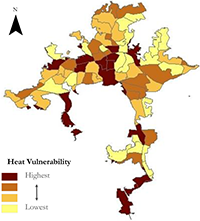 Find your Asheville neighborhood on the Heat Vulnerability Index Interactive Mapper created by NASA-DEVELOP. Poorer, older residents’ neighborhoods are most likely to be barren of tree shade, placing them at highest risk of heat-related stress, illness, and death as global warming worsens.
Find your Asheville neighborhood on the Heat Vulnerability Index Interactive Mapper created by NASA-DEVELOP. Poorer, older residents’ neighborhoods are most likely to be barren of tree shade, placing them at highest risk of heat-related stress, illness, and death as global warming worsens.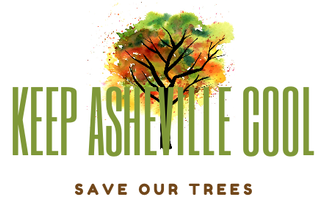 See videos of the Climate Change & Asheville’s Urban Forest Symposium sponsored by Asheville Greenworks and the Urban Forest Commission on November 14, 2019, at A-B Tech, and attended by 400 people. The videos, recorded by Word on the Street videographers, include:
See videos of the Climate Change & Asheville’s Urban Forest Symposium sponsored by Asheville Greenworks and the Urban Forest Commission on November 14, 2019, at A-B Tech, and attended by 400 people. The videos, recorded by Word on the Street videographers, include:
- Overview of the Asheville Urban Tree Canopy Study, recently completed by Davey Resource Group,
- Presentation on tree cover and the urban heat island effect in Asheville by the team from NASA DEVELOP,
- Announcement of a tree canopy goal for Asheville by GreenWorks,
- Keynote presentation by Cindi Sullivan of Trees Louisville,
- Panel presentation by experts on local impacts of and strategies for addressing climate change, and
- Exclusive new interviews with Jennifer Runkle and Ed Macie.
 Connect with local tree activists in Asheville/Buncombe Trees Facebook group.
Connect with local tree activists in Asheville/Buncombe Trees Facebook group.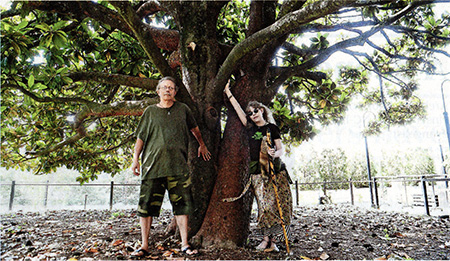 Help Lady Passion and *Diuvei continue and expand this urgent work by making a donation in any amount to Coven Oldenwilde.
Help Lady Passion and *Diuvei continue and expand this urgent work by making a donation in any amount to Coven Oldenwilde.


